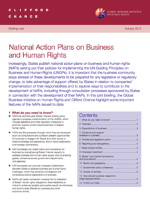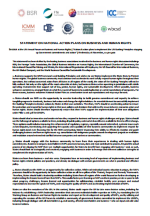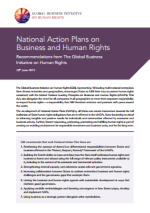National Action Plans
The development of National Action Plans (NAPs) is a process through which all States can create momentum towards the full realisation of their human rights obligations and the transformative vision set by the UN Guiding Principles on Business and Human Rights (UNGPs).
Business briefing on National Action Plans
In October 2015, the Global Business Initiative on Human Rights (GBI) and Clifford Chance released a briefing for business practitioners and leaders on NAPs. The briefing highlights what you need to know, provides an overview of NAPs processes world-wide and explores key issues and challenges commonly addressed through processes to develop NAPs.

NAPs Business Briefing
Business statement on the importance of NAPs
In November 2016, GBI collaborated with leading business and industry organisations to deliver a statement at the UN Annual Forum on Business and Human Rights. Key messages included:
- Business supports the UN Framework and UNGPs, and wishes to see States implement the State duty to protect human rights.
- States should see NAPs as the opportunity to exercise leadership to build genuine commitment and capacity to achieve tangible progress in standards, business behaviour and change for rights-holders.
- States should engage with the business community to learn from their experiences in dealing with human rights commitments.
- States should use the NAPs as an opportunity for collective action.

NAPs business statement
GBI’s recommendations to governments
This statement built on recommendations offered by the GBI team to governments in 2015 on the development of business and human rights-focused NAPs.
In particular, GBI recommends that each National Action Plan focus on:
- Reinforcing the concept of shared by differentiated responsibilities between States and business affirmed in the “Protect, Respect, Remedy” Framework of the UNGPs.
- Building the State’s ability to know and show how the State itself addresses human rights and business at home and abroad using the full range of relevant policy instruments available to it, including in the context of its economic and commercial activities.
- Strengthening internal capacity and coherence across relevant government agencies.
- Increasing collaboration between States to address entrenched business and human rights challenges and the governance gaps that underpin them.
- Linking the business and human rights agenda with sustainable development in ways that reinforce good governance.
- Applying credible methodologies and fostering convergence in how States scope, develop and implement NAPs.
- Using business as a strategic partner alongside other stakeholders.

Recommendations
Consultation on the US National Action Plan on Responsible Business Conduct
In April 2015, GBI collaborated with the International Corporate Accountability Roundtable (ICAR) and the Harrison Institute for Public Law at Georgetown University Law School, to convene a multistakeholder consultation on the development of the US National Action Plan on Responsible Business Conduct. This consultation was hosted as part of the US government’s series of open dialogues that enables stakeholders to exchange and share ideas on the NAP process and content.
The consultation was convened with the following objectives:
- Focusing on the policy and regulatory functions of the government as the framework and foundation for conversation.
- Discussing the full range of tools at the US government’s disposal.
- Learning from what is already in place.
- Aiming to offer pragmatic and clear inputs on prioritised issues.
- Establishing deeper relationships between civil society representatives, business leaders and government officials.
Participants discussed issues, challenges and opportunities relating to overseas investment, aid and development, public procurement, anti-corruption and financial transparency, and access to remedy.

